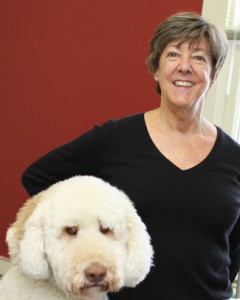
Steve Charles—I just glanced out my Hovey Cottage window to see that Alison Kothe has driven out of the Kane House parking lot (with her labradoodle, Charlie) for the last time as the College’s director of development.
After un-retiring three times to help us successfully complete the $68 million-plus Challenge of Excellence campaign, she’s finally taking retirement seriously this time.
She’s deserves this break. I’m happy for her. But there’s a lump in my throat as I watch her leave.
For 11 years Alison has brought (and taught) a deep understanding that advancement work is ultimately about honoring relationships—honest, heartfelt, mutually beneficial relationships. For Alison, many of those friendships will endure well past her tenure here.
Her work focuses on one person, one moment, at a time. She’s an extraordinary listener and observer. She not only “got” this place, she loves it, and she cares ferociously about our work of teaching and learning and the future it can bring. She holds herself accountable to the relationships she developed with alumni and their families, inspired others to try to be equally caring, and tried her best to teach me to do the same. I will miss her reminders.
My friend Susan Cantrell (who knew Alison from working in Illinois Senator Charles Percy’s office) told me we were lucky to have her here when she first arrived at Wabash in 2001, and Alison has proved her right every day. She eventually took up Susan’s role of having the most recognizable laugh on campus. Not hearing that hearty laugh in classrooms and at campus events and meetings will feel a little like losing them both.
Alison doesn’t like public attention; she didn’t want a fuss made about her retirement, doesn’t trust gushing sentimentality, and she slyly dodged any efforts at a reception.
And that’s fitting, as her best work was always behind the scenes. I glimpsed some of it when I interviewed or visited alumni like Bruce Baker ’66 or Karen and Dan Simmons ’70. But it also came alive in hundreds of face-to-face conversations and emails and phone calls with alumni, students, and faculty; in unexpected kindnesses; in the creative ways she found to connect alumni with the College; in being an advocate for what alumni cared about and finding who at today’s Wabash they would benefit from knowing; in mending fences and listening when alumni were disappointed with their alma mater, then finding a way to begin healing that relationship.
I talked with Alison today for a story I’m writing for the next Wabash Magazine and learned that it was one of Wabash’s legendary professors who directed her toward her vocation at Wabash. So I’ll probably start the story something like this:
Alison Kothe says Wabash Professor John Fischer gave her “the greatest gift” of her working life.
Twelve years ago she had just left an unsatisfying job with a bank when she sat down with Fischer. He had been her brother Jim’s faculty advisor at Wabash and had become a family friend. Fischer told her about an opening in development at the College and suggested she “try something completely new.”
“John said with a sweep of the arm, ‘Child, come to Wabash,’” Alison recalls. “So I did.”
And Wabash is so much better for it.